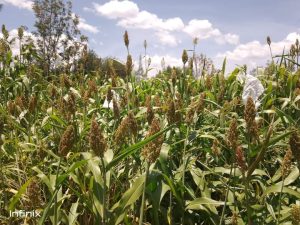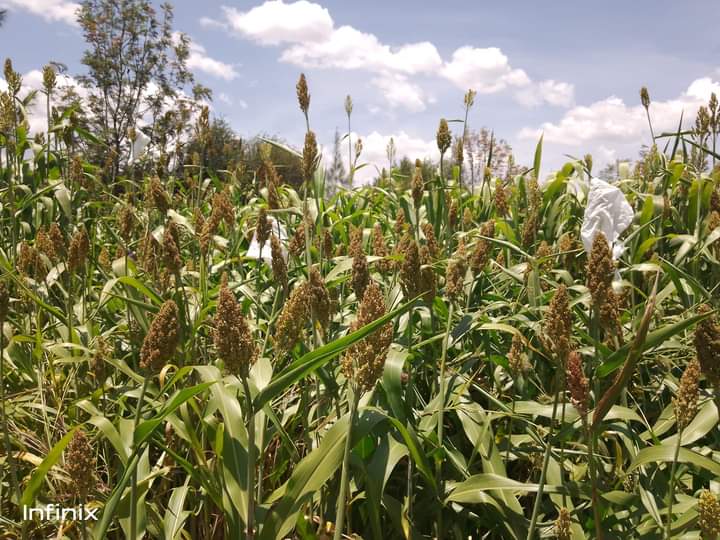Health benefits of millet and sorghum
The exact topic of this article first appeared on www.nimedhealth.com.ng
Millet and Sorghum are cereal crops that belong to the family Poacae. They can be cultivated anywhere, especially in semi-arid tropics, as they are drought tolerant.
Millet
Millets are gluten free grains, with a low glycemic index. There are more than 20 varieties of millets. Some of which include: pearl millet, finger millet, kodo millet etc. They are rich in antioxidants, fiber and proteins, and are also good sources of essential vitamins, and minerals.
For over the years, millet has provided immense benefits to man. It ranks as the sixth important cereal grain worldwide.
Sorghum
Although not well-known, sorghum is an extremely versatile grain that can be cooked in several ways. It is also gluten-free and can be included in any type of diet. It proffers a lot of health benefits. It is also referred to as jowar, Indian millet, or great millet. It is one of the major crops in Africa. Asides human consumption, it is commonly grown and sold for animals as fodders.

Sorghum can be found in different colors and varieties. There is brown, red, purple and even black. Though, the major variety is usually in pale yellow or white colour. This non-gluten grain is nutrient packed and contains minerals such as: iron, proteins, zinc, magnesium, potassium, copper, phosphorus, calcium and B-vitamins. It is also rich in antioxidants that can help protect against cell damage, as well as compounds and phytochemicals.
Millet and sorghum can help reduce your risk of cancer, reduce inflammation, improve healthy blood flow and cardiovascular function.
They are also full of proteins that helps build muscles and promote cell regeneration.
There are a lot of health benefits accompanied with the use of these cereal crops. The aforementioned are just few.
Let’s get to know the health benefits of millet and sorghum.
Read on.
Health benefits of Millet and Sorghum
The following are the health benefits of millets and sorghum:
Promote digestive health:
Millet and sorghum are gluten free, meaning they don’t contain gluten (a type of protein found in wheat that causes digestion problems such as stomach upset and bloating). Millet and sorghum can be consumed by people who are intolerant to wheat. By doing so, prevent certain digestive issues.
Promote healthy development of bones:
Sorghum contains magnesium and calcium that helps promote and maintain strong bones. This process also helps prevent bone diseases such as osteoporosis.
Prevent Cancer development:
Tannins, one of the phenolic compounds in Sorghum has been shown to possess anti-cancer effects that help inhibit the growth and development of breast cancer.
Maintain a healthy weight:
In maintaining a healthy weight, foods rich in fiber should be included in your diets. Millet and sorghum are good sources of fiber. They can help keep you fuller for a longer time, and curb appetite.
Not only do consumption help maintain a healthy weight, it promotes weight loss, and reduces your risk of diseases such as: obesity, diabetes, and heart diseases.
Boost mood:
Millet contains an amino acid known as tryptophan that can help improve mood. This was confirmed in a 2014 research study that revealed that foods rich in tryptophan can help with management of depression and anxiety symptoms.
Reduce inflammation:
Sorghum is known to have powerful antioxidant activities. One of which is phenolic compounds, that help reduce inflammation.
Control blood sugar level:
Compared to other carbs foods, millet and sorghum are low in carbs. They can serve as great substitute to wheat, and can help control blood sugar levels. They digest slowly; therefore, can’t cause a spike in blood sugar levels. For people with diabetes, millets and sorghum are easy and great additions to your diets.
Conclusion
Millet and Sorghum are gluten-free grains safe and healthy for human consumption, even for those with celiac diseases. They are rich in key minerals and vitamins. Safe to say, consumption wouldn’t pose any health risk or concerns, that is if consumed with moderation.
I hope you found this article helpful? Have you tried millet or sorghum before? Let us know in the comment section.























